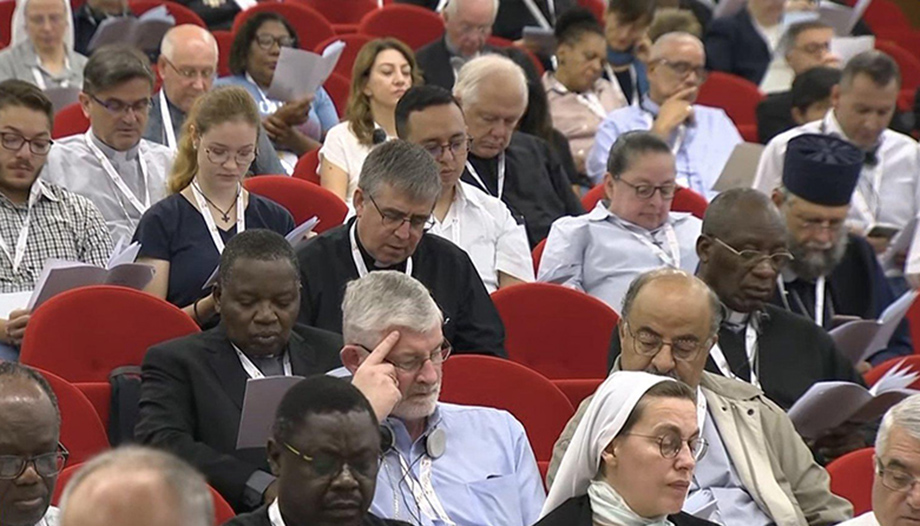The first Synod to be held in accordance with the Apostolic Constitution Episcopalis communio September 15, 2018. "For a Synodal Church: communion, participation and mission": on October 4 will be the first session of the XVI Ordinary General Assembly of the Synod of Bishops.
Stage of a process initiated on October 10, 2021, which will culminate in a new session next year, also in October. The first with the active participation and voting rights of seventy non-bishops, as well as the presence of fifty experts, divided into facilitators and theologians.
Rediscovering the dimension of silence to listen to the voice of the Spirit and making the Synod a place of fraternity: this is the spiritual "path" indicated by Pope Francis to the Church during the Synod. the ecumenical prayer vigil "Together - Gathering of the People of God", on September 30 in St. Peter's Square.
Together with Francis, nineteen ecumenical representatives prayed together and listened to significant testimonies offered by young people, some of them refugees and intellectually disabled.
Pre-retirement
After the ecumenical vigil and on the last day of the spiritual retreat at the "Fraterna Domus" in Sacrofano for the participants in the Synod, Mother Ignazia Angelini pointed out in the celebration "the intimate energy of the synodal journey. In all its steps and passages. The Synod itself takes place as a "celebration".
"Do justice to me, God" (Ps 42:1) gives voice," he observed, "to the groaning of oppressed humanity and of creation subjected to vanity and in travail (Rom 8:20-24), prey to a generalized sadness that clouds our days".
But then, without interruption, we intone: "All things sing and shout for joy" (Ps. 63:14). It is precisely this counterpoint of supplication and praise that is the unmoving song of faith, which brings together the dissonant harmonies of visible and cultured worlds, accompanying us into the night in the struggle to believe, to be in the company of humans as "all brothers and sisters".
Radcliffe echoed him, for whom "the evening convocation of each day, in the Magnificat, welcomes us and reveals to us how to bring to completion every work undertaken in the obedience of faith. As evening falls, the Mother of God awaits us with her song. An extraordinary song because of its potential for a prophetic reading of history. A "maternal" synthesis that gathers and gives light to our frayed human history. And shows the way".
Mary's song is thus given to the Church of God on her journey "to gather in prayer the evening twilight and open the future to each of her steps. Even the synodal meetings".
The Magnificat is, in Father Radcliffe's opinion, for the Church and her synodal process, "a daily grace of fulfillment; a grace that propels her forward, beyond differences and oppositions. It impels with the intimate certainty that the Lord nevertheless gives grace, looks upon poverty, knows-from the Egypt of the oppressed people to the Golgotha of the Son-our labors and afflictions."
With meekness and humility. Names, faces, questions, comparisons, options, under that unifying gaze, "without looking back".
Synodal process
Dario Vitali, professor of ecclesiology at the Department of Dogmatic Theology of the Pontifical Gregorian University, appointed by Pope Francis as coordinator of the expert theologians involved in the Synod, explains the methodology of the Synod's work: "Pope Francis has asked that the whole Church be involved, that everyone be protagonists in the logic of the ecclesiology of the People of God. This explains why Episcopalis communio transforms the Synod from an event into a process, articulated in phases. The first phase involved the participation of the whole Church and everyone in the Church, through the consultation of the People of God in the particular Churches and after the two moments of discernment, in the Episcopal Conferences and in the Continental Assemblies. According to the Second Vatican Council, the People of God participates in the prophetic function of Christ (Lg 12). Therefore, non-bishop members, who do not represent the People of God, but are witnesses to the unity of the synodal process, participate fully in the Assembly. Their presence and their contribution show that the Synod is not a circumscribed Assembly and that the first phase is essential for discernment. And that the themes to be addressed are those that emerge from the consultation of the People of God".
The ultimate goal of the process," Vitali maintains, "is to root a synodal style and form of Church, so that synodality, as a constitutive dimension of the Church, can and must shape the Church itself, its life, its institutions, its way of thinking and working, its mission.
A principle matured in the wake of Tradition, in continuity with the Council, "which does not contradict," concludes the theologian, "the Church of always, but illuminates it with a new light, with that newness that is always in the order of grace, therefore....". nova et vetera, new because old".
Also in the last few days Pope Francis has responded to the 5 Dubia, the questions that some cardinals asked the Holy Father last July. The Pope's answers, in Spanish, have been published on the Dicastery for the Doctrine of the Faith website.







